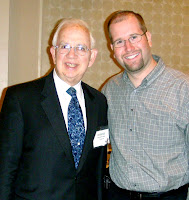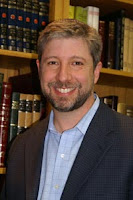 When Rabbi Danny Nevins, my friend, colleague, and personal rabbi, told me a couple months ago that he was being considered for the position of Dean of the Rabbinical School of the Conservative Movement’s central academic institution, the Jewish Theological Seminary, I was immediately torn.
When Rabbi Danny Nevins, my friend, colleague, and personal rabbi, told me a couple months ago that he was being considered for the position of Dean of the Rabbinical School of the Conservative Movement’s central academic institution, the Jewish Theological Seminary, I was immediately torn.
On the one hand, I knew how many people at Adat Shalom Synagogue in Farmington Hills, Michigan (including my parents) would be devastated to lose their beloved rabbi. On the other hand, I knew how many Jewish people around the world would benefit greatly from having their own rabbis influenced by Danny’s insight, warmth, sincerety, and brilliance.
 Rabbi Danny Nevins became the rabbi of my shul just as I was heading off to college, but I quickly found in him everything I was looking for in a personal spiritual advisor — a rebbe. He comforted me when my grandfather passed away. He’s written numerous letters of recommendation on my behalf. He officiated at my wedding and the naming celebrations for two of my children. For the past thirteen years, as I decided to become a rabbi, studied in rabbinical school, and took my own congregation, Rabbi Nevins has been my closest advisor. He’s a rabbi’s rabbi and always seems to just “get it.” He is an academic and a spiritual guide. He is progressive and yet always guarding the Tradition.
Rabbi Danny Nevins became the rabbi of my shul just as I was heading off to college, but I quickly found in him everything I was looking for in a personal spiritual advisor — a rebbe. He comforted me when my grandfather passed away. He’s written numerous letters of recommendation on my behalf. He officiated at my wedding and the naming celebrations for two of my children. For the past thirteen years, as I decided to become a rabbi, studied in rabbinical school, and took my own congregation, Rabbi Nevins has been my closest advisor. He’s a rabbi’s rabbi and always seems to just “get it.” He is an academic and a spiritual guide. He is progressive and yet always guarding the Tradition.
It is bittersweet to know that I will now have to share his wise counsel with hundreds of other rabbis — both future and present leaders of the Jewish community. But for the sake of Judaism and the future strength of the Conservative Movement, this is a wonderful choice. Together with Chancellor Arnie Eisen, Dean Danny Nevins will help bring the Conservative Movement to its true potential.
Mazel Tov to Rabbi Nevins… chazak v’amatz!
The Detroit Free Press article is here.
Here is the press release from JTS:
The Jewish Theological Seminary announced today that Rabbi Daniel Nevins has been named the next Dean of The Rabbinical School. The Jewish Theological Seminary is the academic and spiritual center of Conservative Judaism worldwide.
Rabbi Nevins, who will assume his post on July 1, 2007, succeeds Rabbi William Lebeau, who joined JTS as Vice Chancellor for Rabbinic Development in 1988. Since then, he has served twice as Dean of The Rabbinical School, from 1993-1999, and most recently from June 2004 until the present.
Rabbi Nevins is currently the Senior Rabbi of Adat Shalom Synagogue in Farmington Hills, Michigan, where he previously served as Assistant Rabbi. A 1994 graduate of The Rabbinical School, he received an MA in Hebrew Letters from JTS in 1991 and a BA, magna cum laude, from Harvard College in 1989, from where he also received an MA in history. A native of New Jersey, Rabbi Nevins studied at Yeshivat HaMivtar in Jerusalem, and was the recipient of the prestigious Wexner Foundation Graduate Fellowship.
“I am delighted to announce the appointment of Rabbi Daniel Nevins as the next Dean of The Rabbinical School,” said Arnold M. Eisen, Chancellor-elect of JTS. “Rabbi Nevins brings to his new tasks the wealth of experience, wisdom and compassion gained during his thirteen years as a congregational rabbi in a thriving community. He also impressed the Search Committee and me with his energy, his ideas, and his passionate commitment to Torah, the Jewish people, and Conservative Judaism. Danny’s deep appreciation for our movement’s standards, its principles, and its pluralistic nature will serve us well at this time of challenge and transition for the movement. His years of work on the Rabbinical Assembly Law Committee are a testament to his vision, his leadership, and his scholarship. I am excited at the prospect of working with Rabbi Nevins as I assume the leadership of JTS, certain that he will meet our challenges with confidence and seize hold with both hands of the many opportunities before us.”
“I am honored and excited by the opportunity to serve as Pearl Resnick Dean of The Rabbinical School,” stated Rabbi Nevins. “For the past thirteen years I have had an extraordinary experience as Rabbi of Adat Shalom Synagogue. I have experimented in the ultimate laboratory of Jewish life, learning what works through the prism of countless pastoral, intellectual, and spiritual interactions with my congregation. I will miss my community, but I will take what I have learned from them to benefit the next generation of rabbis. As Dean of The Rabbinical School, I look forward to working with an extraordinary team of faculty, students, and administrators to create a sacred place of Torah study and observance.”
Rabbi Nevins serves on the Rabbinical Assembly’s International Executive Council and is a member of the RA’s Committee on Jewish Law and Standards (CJLS) His halakhic writings include several responsa approved by the CJLS as well as co-authorship of “Homosexuality, Human Dignity and Halakhah,” a responsum arguing for the normalization of the status of gay and lesbian Jews that was approved by the CJLS last month. His many general Jewish essays include, among others, “A Place Among the Mourners of Zion,” an exploration of the history and meaning of a familiar expression of comfort, published in Conservative Judaism (Summer 2006), and “Gadol Kvod HaBriot: Placing Human Dignity in the Center of Conservative Judaism,” which appeared in Judaism (Summer 2005), a quarterly journal published by the American Jewish Congress.
Rabbi Nevins is past President of the Michigan region of the Rabbinical Assembly and serves on the Board of the Frankel Jewish Academy of Metropolitan Detroit. Deeply committed to interfaith and interreligious work, he is past President of the Farmington Area Interfaith Association and the ecumenical Michigan Board of Rabbis, and a member of the Board of the Detroit chapter of the Michigan Roundtable for Diversity and Inclusion. In May 2005, Rabbi Nevins led a group of Protestant and Catholic leaders on a unique trip that included Pope Benedict XVI’s first public audience, Yom Hasho’ah (Holocaust Memorial Day) at Titus’s Arch in Rome, and a week in Israel visiting Jewish and Christian holy places.
(c) Rabbi Jason Miller | http://blog.rabbijason.com | Twitter: @RabbiJason | facebook.com/rabbijasonmiller
Now, the Hartman Institute in Jerusalem has announced that it will open its own rabbinical school at its German Colony location. In a Jerusalem Post article titled “Hartman Institute to ordain women rabbis”, Matthew Wagner writes:




